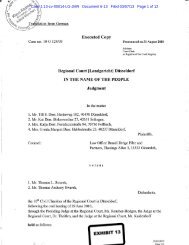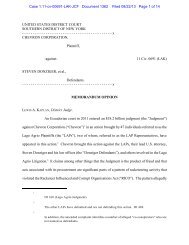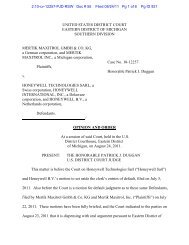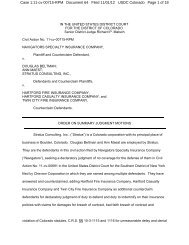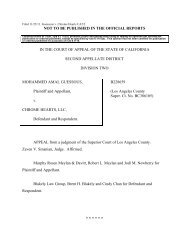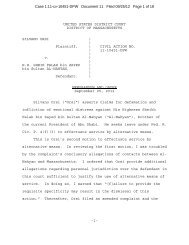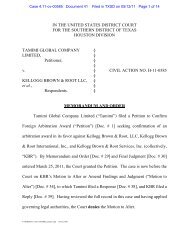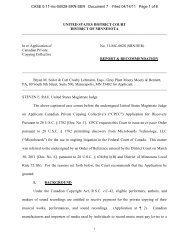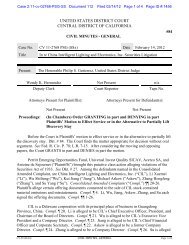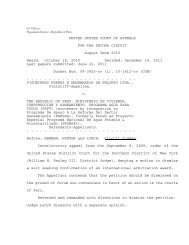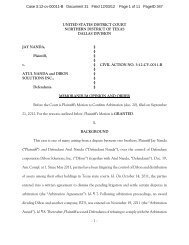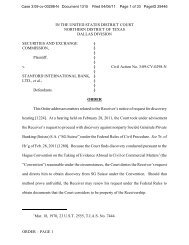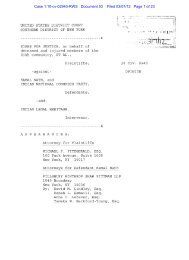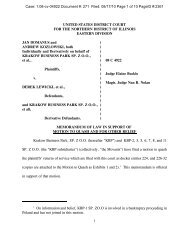memorandum - Letters Blogatory
memorandum - Letters Blogatory
memorandum - Letters Blogatory
You also want an ePaper? Increase the reach of your titles
YUMPU automatically turns print PDFs into web optimized ePapers that Google loves.
Case 1:11-cv-12331-WGY Document 7 Filed 01/05/12 Page 1 of 18<br />
UNITED STATES DISTRICT COURT<br />
DISTRICT OF MASSACHUSETTS<br />
ED MOLONEY, and ANTHONY )<br />
McINTYRE, )<br />
)<br />
Plaintiffs, )<br />
) Civil Action No. 11-12331-WGY<br />
v. )<br />
)<br />
ERIC H. HOLDER, JR., Attorney General, )<br />
and JOHN T. McNEIL, Commissioner, )<br />
)<br />
Defendants. )<br />
DEFENDANTS’ CONSOLIDATED MEMORANDUM<br />
IN OPPOSITION TO MOTION FOR PRELIMINARY<br />
INJUNCTION AND IN SUPPORT OF MOTION TO DISMISS<br />
Following this Court’s denial of their motion to intervene in In Re: Request from<br />
the United Kingdom, etc., M.B.D. No. 11-91078-WGY (“In Re: Request from the U.K.”),<br />
the plaintiffs Ed Moloney and Anthony McIntyre have filed this action against Attorney<br />
General Eric Holder and John McNeil, Commissioner, making essentially the same<br />
claims and arguments as those raised in In Re: Request from the U.K. For substantially the<br />
same reasons urged by the government against intervention, plaintiffs’ motion for a<br />
preliminary injunction here should be denied and their complaint dismissed.<br />
INTRODUCTION<br />
In light of the Court’s familiarity with the underlying facts and legal arguments,<br />
see Document No. (“D.”) 32 in 11-mc-91078, and in the interest of brevity, the<br />
defendants forego a detailed description of plaintiffs’ new complaint and the related
Case 1:11-cv-12331-WGY Document 7 Filed 01/05/12 Page 2 of 18<br />
proceedings in In Re: Request from the U.K. The defendants simply note that the<br />
plaintiffs in this action seek, inter alia, (1) judicial review of the Attorney General’s<br />
actions under the Administrative Procedure Act, Act, 5 U.S.C. §§ 701 - 706 (“APA”); (2)<br />
declaratory relief on a variety of subjects; (3) a writ of mandamus compelling the<br />
Attorney General to perform certain duties under a Treaty and thereafter to report to the<br />
Court; and (4) injunction relief, including a preliminary injunction, prohibiting the<br />
defendants from disclosing the materials at issue to the government of the United<br />
Kingdom under the Treaty Between the Government of the United States of America and<br />
the Government of the United Kingdom of Great Britain and Northern Ireland, signed<br />
December 16, 2004, implementing the Mutual Legal Assistance Agreement with the<br />
European Union, signed June 25, 2003, S. Treaty Doc. No. 109-13 (“US-UK MLAT”).<br />
A. The Plaintiffs Lack Standing to Sue<br />
Neither plaintiff can show the “concrete and particularized injury” that is necessary<br />
to establish the constitutional standing needed for their legal claims against the Attorney<br />
General and the Commissioner. See generally Becker v. Federal Election Commission,<br />
230 F.3d 381, 384-85 (1st Cir. 2000) (citing Valley Forge Christian Coll. v. Americans<br />
United for Separation of Church and State, Inc., 454 U.S. 464, 472 (1982)). Neither<br />
plaintiff claims to possess the information sought by the subpoenas, and neither plaintiff<br />
has any obligation to respond to the subpoenas. Neither plaintiff alleges he is a target of<br />
the underlying investigation.<br />
2
Case 1:11-cv-12331-WGY Document 7 Filed 01/05/12 Page 3 of 18<br />
Even were there a legitimate First Amendment right at stake (which there is not),<br />
any such right belongs not to plaintiffs but to Boston College, which possesses the<br />
information sought by the subpoenas and has the obligation to disclose it in accordance<br />
with the Court’s orders. The plaintiffs’ alleged First Amendment interest is abstract and<br />
lacks the concreteness necessary to satisfy Article III’s standing requirement. See Save<br />
Our Heritage, Inc. v. F.A.A., 269 F.3d 49, 55 (1st Cir. 2001); Town of Norwood v.<br />
1<br />
F.E.R.C., 202 F.3d 392, 405 (1st Cir. 2000). The Belfast Project ended in May 2006.<br />
Their past employment by Boston College has not conferred on them some unique status<br />
or Constitutional right.<br />
Messrs Moloney and McIntyre assert that the disclosure of the tape recordings and<br />
related materials to law enforcement officials would jeopardize their personal safety.<br />
This claim, however, is simply too speculative to meet the “concrete and particularized<br />
injury” test. See Lujan v. Defenders of Wildlife, 504 U.S. 555, 560 (1992) (plaintiff’s<br />
injury-in-fact must be “actual or imminent, not conjectural or hypothetical”) (internal<br />
quotations and citations omitted); Nulankeyutmonen Nkihtaqmikon v. Impson, 503 F.3d<br />
18, 26-27 (1st Cir. 2007) (same). As pointed out by the Government in In Re: Request<br />
from the U.K., see Opposition to Motion to Quash and Motion for an Order to Compel<br />
(D.7) at 16, both plaintiffs have already widely publicized their respective involvement in<br />
1 See Ex. E to Complaint (D.1-6) at 3; and Ex. 2 to proposed Complaint attached<br />
to Motion to Intervene in In re Request from the U.K., (D. 18-2) at 26.<br />
3
Case 1:11-cv-12331-WGY Document 7 Filed 01/05/12 Page 4 of 18<br />
the Belfast Project. The public filing of their affidavits in In Re: Request from the U.K.<br />
and in the instant case has further established this as a matter of public record. It is pure<br />
speculation to suggest that the disclosure of the subpoenaed materials to law enforcement<br />
2<br />
officials will cause someone to engage in a criminal act against the interviewers. Any<br />
asserted interest in protecting the safety of plaintiffs’ sources does not suffice to establish<br />
standing, as they are in no position to rest their claims on the interests of third parties.<br />
Warth v. Selden, 422 U.S. 490, 499 (1975); see Hunt v. Washington State Apple Adver.<br />
Comm’n, 432 U.S. 333, 343 (1977). 3<br />
To the extent the Complaint can be read to assert that Mr. Moloney and Mr.<br />
McIntyre each has an interest in protecting an independent and personal “duty of<br />
confidentiality” to interviewees, any such assertion lacks substance. First, there is no<br />
legally-cognizable “duty of confidentiality.” Second, the impacts of any breach of<br />
confidentiality are on the recipients of the promise, not on the plaintiffs. In any event,<br />
disclosure of information by the recipient of the subpoena, Boston College, does not<br />
violate plaintiffs’ duty of confidentiality, and plaintiffs have neither standing nor a legal<br />
right of action to try to protect any such duty belonging to Boston College.<br />
2<br />
Notably, the Affidavit of Mr. McIntryre’s wife recounts fear for personal safety going<br />
back to 2000, and threats and an incident of vandalism to their neighbor’s home associated with<br />
the publication of Mr. Maloney’s book in the spring of 2010 -- well before the initiation of In Re:<br />
Request from the U.K. Affidavit of Carrie Twomey (D.1-8) at 3, 8-9.<br />
3 For the same reason, plaintiffs lack standing to assert the interests of any target of the<br />
underlying investigation.<br />
4
B. The US-UK MLAT Does Not Give Rise to Judicially Enforceable<br />
Private Rights<br />
As they did in their Motion to Intervene in In Re: Request from the U.K., D.18-1,<br />
plaintiffs here assert that they are entitled to relief because the Attorney General has<br />
failed properly to fulfill his obligations under the US-UK MLAT. The contention rests on<br />
two provisions of the US-UK MLAT. First, the Complaint asserts that the Attorney<br />
General failed to make findings supposedly required by Article 3, § 1 of the US-UK<br />
MLAT, which sets forth certain reasons why the Attorney General may refuse assistance.<br />
Complaint 40-45. Second, the Complaint asserts that the Attorney General has failed<br />
to properly fulfill his obligation to consult with his counterpart in the U.K. with regard to<br />
“rights or obligations under another bilateral or multilateral agreement relating to the<br />
subject matter of this Treaty,” pursuant to Article 18, § 1 of the US-UK MLAT. Id.<br />
53-60.<br />
Case 1:11-cv-12331-WGY Document 7 Filed 01/05/12 Page 5 of 18<br />
As the government pointed out previously, the US-UK MLAT by its terms does<br />
not give rise to any private rights. Article 1, § 3 of the MLAT provides:<br />
This Treaty is intended solely for mutual legal assistance<br />
between the Parties. The provisions of this Treaty shall not<br />
give rise to a right on the part of any private person to obtain,<br />
suppress, or exclude any evidence, or to impede the execution<br />
of a request.<br />
Courts considering this provision have uniformly ruled that private persons have<br />
no legal right to enforce an MLAT. For example, in U.S. v. $734,578.82 in U.S.<br />
Currency, 286 F.3d 641, 658-659 (3d Cir. 2002), the court considered a claimant’s<br />
5
Case 1:11-cv-12331-WGY Document 7 Filed 01/05/12 Page 6 of 18<br />
argument that the seizure and subsequent forfeiture of his money violated the<br />
then-existing version of the US-UK MLAT because the United States was obligated to<br />
consult with the United Kingdom's Home Secretary before seizing the accounts. Relying<br />
on the identical language of Article 1, § 3 quoted above, the court ruled that “the treaty<br />
explicitly states that it is not intended to provide a private remedy,” and held, “[t]herefore,<br />
even it if is assumed for argument’s sake that the United States violated the MLAT,<br />
Claimants have no private right to enforce its terms.” 286 F.3d at 659.<br />
More recently, in a case where the defendant asserted that evidence against him<br />
was improperly admitted at trial because it was gathered in violation the MLAT between<br />
the Netherlands and the United States, United States v. Rommy, 506 F.3d 108, 129 (2d<br />
Cir. 2007), the Second Circuit held that the evidence was not obtained in violation of the<br />
MLAT, and also ruled:<br />
A second reason [defendant’s] MLAT argument fails is that<br />
he cannot demonstrate that the treaty creates any judicially<br />
enforceable individual right that could be implicated by the<br />
government's conduct here. As the Supreme Court has long<br />
observed, absent explicit treaty language conferring<br />
individual enforcement rights, treaty violations are generally<br />
addressed by the signatory sovereigns through diplomatic<br />
channels. See Head Money Cases, 112 U.S. 580, 598 (1884)<br />
(noting that “treaty is primarily a compact between<br />
independent nations” and “depends for the enforcement of its<br />
provisions on the interest and the honor of the governments<br />
which are parties to it”). For any number of reasons,<br />
sovereigns may elect to overlook non-compliance with<br />
particular treaty requirements in given cases. Thus, a proper<br />
respect for the diplomatic choices of sovereign nations<br />
prompts courts generally to apply “a strong presumption<br />
6
Case 1:11-cv-12331-WGY Document 7 Filed 01/05/12 Page 7 of 18<br />
506 F.3d at 129-130.<br />
against inferring individual rights from international treaties.”<br />
United States v. De La Pava, 268 F.3d 157, 164 (2d Cir.<br />
2001).<br />
The district court in U.S. v. Chitron Electronics Co. Ltd., 668 F.Supp.2d 298,<br />
306-307 (D. Mass. 2009) (Saris, D.J.), reached the same conclusion in rejecting a<br />
defendant’s claim that a summons was ineffective because service of the summons failed<br />
to comply with the MLAT between the United States and China. The court stated<br />
succinctly, “the MLAT does not create a private right of enforcement of the treaty.” Id.<br />
See generally Medellin v. Texas, 552 U.S. 491, 505-506 (2008); United States v. Li, 206<br />
F.3d 56, 60 (1st Cir. 2000) (“treaties do not generally create rights that are privately<br />
enforceable in the federal courts.”). 4<br />
C. The Administrative Procedure Act Provides No Right of Judicial<br />
Review Here<br />
Plaintiffs apparently contend that, notwithstanding the above authorities, they are<br />
entitled to judicial review under the APA. Of course, none of the decisions recognizing<br />
4<br />
The plaintiffs suggest that in this action they are entitled to invoke the standard of<br />
review applicable under 18 U.S.C. § 3512 and Rule 17(c)(2) of the Federal Rules of Criminal<br />
Procedure. See Compl. 4, 6-7, 17. There is no basis, however, for incorporating those<br />
criminal laws into this civil action brought under the APA. The relevant inquiry under the APA<br />
is set forth in 5 U.S.C. § 706, and includes whether the agency action is “arbitrary, capricious, an<br />
abuse of discretion, or otherwise not in accordance with law.” In contrast, 18 U.S.C. § 3512 is<br />
primarily procedural in nature and has no relevance to the issues raised by the plaintiffs.<br />
Similarly, Fed. R. Crim. P. 17(c)(2) governs the circumstances in which a district court may<br />
quash a subpoena, and this too has no relevance to an APA action for review of the Attorney<br />
General’s actions.<br />
7
Case 1:11-cv-12331-WGY Document 7 Filed 01/05/12 Page 8 of 18<br />
there is no individual right of action to enforce an MLAT even hints that plaintiffs could<br />
circumvent that limitation by the mere expedient of making a claim under the APA. That<br />
is because they can’t.<br />
1. The US-UK MLAT Precludes Judicial Review<br />
The APA by its terms does not apply where “statutes preclude judicial review.”<br />
5 U.S.C. § 701(a)(1). See generally Block v. Community Nutrition Inst., 467 U.S. 340,<br />
345 (1984); Natural Resources Defense Council v. Johnson, 461 F.3d 164, 171-172 (2nd<br />
Cir. 2006); Sarit v. U.S. Drug Enforcement Admin., 987 F.2d 10, 16-17 (1st Cir. 1993).<br />
The presumption favoring judicial review may be overcome by “specific language” or<br />
“inferences of intent drawn from the statutory scheme as a whole.” Bowen v. Michigan<br />
Acad. of Family Physicians, 476 U.S. 667, 673 & n. 4 (1986). In this context, the US-UK<br />
MLAT is appropriately regarded as a “statute.” See In re Premises Located at 840 140th<br />
Ave. NE, Bellevue, Wash., 634 F.3d 557, 568 (9th Cir. 2011) (“A ratified self-executing<br />
treaty generally stands on the same footing as a federal statute”).<br />
Article 1, § 3 of the MLAT could not be more clear in foreclosing this action. The<br />
plaintiffs’ APA claims are premised on the contention that the treaty gives rise to an<br />
enforceable right to preclude the execution of a request for assistance if the treaty’s<br />
obligations are not fulfilled. This contention is precisely what Article 1, § 3 precludes.<br />
Plaintiffs invoke Conservation Law Foundation, Inc. v. Busey, 79 F.3d 1250, 1261<br />
(1st Cir. 1996), to suggests their APA claim is authorized by the court’s recognition of a<br />
8
Case 1:11-cv-12331-WGY Document 7 Filed 01/05/12 Page 9 of 18<br />
“broad spectrum of judicial review of agency action,” and its statement that “an implied<br />
right of action is not a predicate” for such review. See Complaint 47. Their reliance on<br />
Busey, however, is misplaced. The Busey court rejected the argument that APA review of<br />
an agency decision was unavailable because of Supreme Court precedent indicating that<br />
the statute there did not create an implied private right of action for damages. The issue<br />
here is not whether the US-UK MLAT creates an implied private right of action for<br />
damages, but instead whether the treaty negates any right of a private party to seek<br />
enforcement of the treaty’s terms in order to impede the execution of a request. The text<br />
of the treaty compels an affirmative answer. The US-UK MLAT “is intended solely for<br />
mutual legal assistance between the Parties.” It “shall not give rise to a right on the part<br />
of any private person to obtain, suppress, or exclude any evidence, or to impede the<br />
5<br />
execution of a request.”<br />
That the US-UK MLAT precludes APA review here is strongly supported by long-<br />
standing Supreme Court precedent concerning judicial review of questions of foreign<br />
affairs. “Matters intimately related to foreign policy and national security are rarely<br />
proper subjects for judicial intervention.” Haig v. Agee, 453 U.S. 280, 292 (1981); see<br />
also In re Premises Located at 840 140th Avenue NE, Bellevue, Washington, 634 F.3d at<br />
5<br />
The plaintiffs assert that Article 1, § 3 of the US-UK MLAT “relates to private rights<br />
regarding evidence, but is silent on judicial review of the Attorney General’s compliance with the<br />
terms of the US-UK MLAT.” Complaint 48. If by this the plaintiffs mean that they do not<br />
seek to enjoin enforcement of the subpoenas but merely seek judicial review of the Attorney<br />
General’s actions, the Court should reject this as disingenuous; it is obvious that plaintiffs’ true<br />
intent is stop the execution of the subpoenas.<br />
9
Case 1:11-cv-12331-WGY Document 7 Filed 01/05/12 Page 10 of 18<br />
572-573 (“[t]he court’s role in this context is limited, however, and must be tempered by<br />
the recognition that ‘the field of foreign affairs’ is one that ‘the Constitution entrusts to<br />
the President and the Congress.’”) (quoting Zschernig v. Miller, 389 U.S. 429, 432<br />
(1968)). Similar principles are at play in cases recognizing the “strong presumption<br />
against inferring individual rights from international treaties.” United States v. Rommy,<br />
506 F.3d at 129, quoting United States v. De La Pava, 268 F.3d at 164.<br />
The judicial intervention sought by the plaintiffs here is inconsistent with these<br />
principles. According to the plaintiffs, this Court should compel the Attorney General to<br />
consult with the U.K. Secretary of State “regarding the U.K.’s obligations under the<br />
related Extradition Treaty between the United States of America and the United Kingdom<br />
of Great Britain and Northern Ireland, and related exchanges of letters. . . .” Complaint<br />
54. They ask this Court to determine whether the Attorney General gave due regard “to<br />
essential interests of the United States or requests which would be contrary to important<br />
public policy considerations of the United States, as well as to assess the political<br />
character of the offense at issue, before legal assistance may be considered.” Id. 81.<br />
The plaintiffs would have this Court rule on whether “[t]he Attorney General improperly<br />
and unreasonably has failed to have regard to the essential interests and/or important<br />
public policy considerations of the United States . . . relating to offenses committed prior<br />
to the Good Friday Agreement . . . .” Id. 82. These issues would embroil the Court in<br />
matters directly involving relations between the United States and the United Kingdom.<br />
10
An instructive case is Committee of United States Citizens Living in Nicaragua v.<br />
Reagan, 859 F.2d 929, 942-943 (D.C. Cir. 1998), in which private parties sued to enforce<br />
a decision of the International Court of Justice (“ICJ”) which had held that America’s<br />
support of military actions by the so-called “Contras” against the government of<br />
Nicaragua violated both customary international law and a treaty between the United<br />
States and Nicaragua. The court of appeals first held that domestic law provided no basis<br />
for enforcing the judgment of the ICJ. 859 F.2d at 935-942. The court then addressed<br />
whether the APA provided any independent basis for relief. In ruling it did not, the court<br />
observed that:<br />
Case 1:11-cv-12331-WGY Document 7 Filed 01/05/12 Page 11 of 18<br />
[i]n theory, a law such as the APA could supersede these<br />
limitations in the ICJ statute, transforming ICJ decisions into<br />
legal standards for domestic judicial review. But, as<br />
Professor Davis explains, the APA does not possess such<br />
generative capacity. “Because the APA provision on<br />
reviewability is always dependent on other law, the law of<br />
reviewability is essentially the same as it would be without<br />
any APA provision.” 5 K. Davis, Administrative Law<br />
Treatise § 28.1, at 256 (2d ed. 1984) (emphasis in original);<br />
see also id. at § 29.1. In sum, the APA does not grant judicial<br />
review of agencies’ compliance with a legal norm that is not<br />
otherwise an operative part of domestic law.<br />
Id. at 942-943. Here, there is an even more compelling case against affording APA<br />
review because the US-UK MLAT, which expressly denies a right of action to private<br />
parties, affirmatively vitiates any substantive basis for reviewing the Attorney General’s<br />
decision to provide assistance.<br />
11
Case 1:11-cv-12331-WGY Document 7 Filed 01/05/12 Page 12 of 18<br />
2. The Challenged Actions Are “Committed to Agency Discretion by<br />
Law”<br />
The APA also does not apply to the extent that “agency action is committed to<br />
agency discretion by law.” 5 U.S.C. § 701(a)(2); see Heckler v. Chaney, 470 U.S. 821<br />
(1985) (holding that an agency’s decision not to undertake certain enforcement action is<br />
not subject to judicial review under the APA). It is apparent from the text of the US-UK<br />
MLAT that the determinations of the Attorney General challenged in this case are<br />
textually committed entirely to his discretion. Under Article 3, § 1(a), the Attorney<br />
General “may” refuse assistance if “the Requested Party is of the opinion that the request,<br />
if granted, would impair its sovereignty, security, or other essential interests or would be<br />
contrary to important public policy.” Under Article 3, § 1(c)(I), the Attorney General<br />
“may” refuse assistance if “the request relates to an offence that is regarded by the<br />
Requested Party as: (1) an offence of a political character.” The words “may,” “of the<br />
opinion,” and “regarded by the Requested Party” convey complete discretion. And to<br />
recognize a right to judicial review of such matters would entangle the courts in national<br />
and international policy questions about what would “impair” the United States’<br />
“sovereignty, security, or other essential interests” or would be “contrary to important<br />
public policy.” See Haig v. Agee, 453 U.S. at 292.<br />
Similarly, whether and in what fashion the Attorney General is obliged to request<br />
consultation with his counterpart in the U.K. under Article 18, § 1 of the US-UK MLAT,<br />
is a matter properly within the unconstrained discretion of the Attorney General. Section<br />
12
Case 1:11-cv-12331-WGY Document 7 Filed 01/05/12 Page 13 of 18<br />
1, on which plaintiffs rely, provides that “[t]he Parties, or Central Authorities” shall<br />
consult, “at the request of either . . . if either Party has rights or obligations under another<br />
bilateral or multilateral agreement relating to the subject matter of this Treaty.” The duty<br />
to consult arises only “at the request” of either Party; the treaty imposes no obligation to<br />
make a request, thus leaving that decision entirely to the discretion of the Party. “The<br />
conduct of the foreign relations of our government is committed by the Constitution to the<br />
executive and legislative - ‘the political’ - departments of the government, and the<br />
propriety of what may be done in the exercise of this political power is not subject to<br />
judicial inquiry or decision.” Oetjen v. Cent. Leather Co., 246 U.S. 297, 302 (1918).<br />
The traditional presumption against judicial review of matters involving foreign<br />
relations brings the claims here squarely within the APA exception as applied in Heckler<br />
v. Chaney, which involved an analogous action – an agency’s discretion to refuse to take<br />
enforcement action – and which the Supreme Court held “should be presumed immune<br />
from judicial review under § 701(a)(2).” 470 U.S. at 832.<br />
D. The Plaintiffs’ Claim Under the Declaratory Judgment Act Should Be<br />
Dismissed<br />
The Declaratory Judgment Act, 28 U.S.C. § 2201, does not provide an independent<br />
basis of jurisdiction for the plaintiffs’ claims against the Attorney General. See Skelly Oil<br />
Co. v. Phillips Petroleum Co., 339 U.S. 667, 671 (1950) (“[T]he operation of the<br />
Declaratory Judgment Act is procedural only. Congress enlarged the range of remedies<br />
available in the federal courts but did not extend their jurisdiction.”) (internal quotation<br />
13
Case 1:11-cv-12331-WGY Document 7 Filed 01/05/12 Page 14 of 18<br />
marks and citations omitted); accord, Progressive Consumers Fed. Credit Union v.<br />
United States, 79 F.3d 1228, 1230 (1st Cir.1996) (“the Declaratory Judgment Act . . .<br />
[does not] constitute a waiver of sovereign immunity because the Act ‘neither provides<br />
nor denies a jurisdictional basis for actions under federal law, but merely defines the<br />
scope of available declaratory relief.’”) (quoting McCarthy v. Marshall, 723 F.2d 1034,<br />
6<br />
1037 (1st Cir.1983)). As demonstrated above, there is no independent basis for<br />
jurisdiction of the claims asserted in the Complaint; consequently the Declaratory<br />
Judgment Act is of no avail.<br />
E. Mandamus Is Unavailable Here<br />
It is well-established that the writ of mandamus will issue “only where the duty to<br />
be performed is ministerial and the obligation to act peremptory, and plainly defined.”<br />
United States ex rel. McLennan v. Wilbur, 283 U.S. 414, 420 (1931); accord, Heckler v.<br />
Ringer, 466 U.S. 602, 616 (1984) (“The common law writ of mandamus, as codified in 28<br />
U.S.C. § 1361, is intended to provide a remedy for a plaintiff only if he has exhausted all<br />
other avenues of relief and only if the defendant owes him a clear nondiscretionary<br />
duty.”); and see In re City of Fall River, Massachusetts, 470 F.3d 30, 32 (1st Cir. 2006)<br />
(“Mandamus is regarded as an extraordinary writ reserved for special situations.”). As<br />
discussed previously, Article 1, § 3 of the US-UK MLAT makes it clear that the Attorney<br />
6<br />
See also, Alberto San, Inc. v. Consejo De Titulares Del Condominio San Alberto, 522<br />
F.3d 1, 5 (1st Cir. 2008) (“That Act merely ‘makes available an added anodyne for disputes that<br />
come within the federal courts’ jurisdiction on some other basis.’”) (quoting Ernst & Young v.<br />
Depositors Econ. Prot. Corp., 45 F.3d 530, 534 (1st Cir.1995)).<br />
14
Case 1:11-cv-12331-WGY Document 7 Filed 01/05/12 Page 15 of 18<br />
General owes no legal duty under that treaty to the plaintiffs, much less one that is<br />
nondiscretionary. This forecloses any possibility of mandamus relief.<br />
F. The Complaint’s Constitutional Claims Are Unfounded<br />
Both plaintiffs allege violations of their First and Fifth Amendment rights. Mr.<br />
McIntyre’s constitutional claims should be rejected because, as a non-resident alien living<br />
in Ireland (see Complaint 5), he has no rights under our Constitution. “It is well<br />
established that certain constitutional protections available to persons inside the United<br />
States are unavailable to aliens outside of our geographic borders.” Zadvydas v. Davis,<br />
533 U.S. 678, 693 (2001); see United States v. Verdugo-Urquidez, 494 U.S. 259, 269<br />
(1990) (Fifth Amendment’s protections do not extend to aliens outside the territorial<br />
7<br />
boundaries); Johnson v. Eisentrager, 339 U.S. 763, 784-85 (1950) (same). Mr. McIntyre<br />
does not reside in United States or claim to be a U.S. citizen; therefore, he has no standing<br />
to invoke rights under the Constitution. The fact that his wife and children are U.S.<br />
citizens is of no significance. They are not parties to this case, and Mr. McIntyre is in no<br />
position to claim standing based on the interests of non-parties. Warth v. Selden, 422<br />
U.S. 490, 499 (1975).<br />
7<br />
See also Bridges v. Wixon, 326 U.S. 135, 148, 161 (1945) (observing that resident<br />
aliens have First Amendment rights, but noting that “an alien obviously brings with him no<br />
constitutional rights”); Boumediene v. Bush, 476 F.3d 981, 991 (D.C. Cir. 2007) (“Precedent in<br />
this court and the Supreme Court holds that the Constitution does not confer rights on aliens<br />
without property or presence within the United States.”).<br />
15
Case 1:11-cv-12331-WGY Document 7 Filed 01/05/12 Page 16 of 18<br />
With regard to Mr. Moloney, his claim of a First Amendment interest is too remote<br />
and speculative, for the reasons explained in Part A of this Argument, above.<br />
Furthermore, as argued in the Government’s Opposition to Motion to Quash and Motion<br />
For an Order to Compel in In Re: Request from the U.K. (D.7 at 13-15), the Supreme<br />
Court has rejected the notion of a First Amendment privilege to conceal information in<br />
the face of a subpoena in a criminal matter, and, in any event, any First Amendment<br />
interest he may have is currently being afforded ample protection in the ongoing<br />
proceedings in In Re: Request from the U.K.<br />
8<br />
Mr. Moloney’s Fifth Amendment claim -- the alleged violation of his<br />
“constitutional right to life” (Complaint 27, 54) -- lacks factual and legal substance.<br />
To begin with, the proposed Complaint is devoid of any facts that would suggest that<br />
Boston College’s compliance with the subpoenas would create a meaningful risk to Mr.<br />
Moloney’s life. His Affidavit expresses no concern that his own safety would be<br />
jeopardized by compliance with the subpoenas. This makes sense, inasmuch as he makes<br />
no claim that he was a member of the IRA nor does he claim that he was subject to a code<br />
of silence. He does not allege that he himself disclosed confidential information about<br />
the IRA in the course of the interviews; and he lives in the United States, far from the<br />
locus of the historic conflict. The unsupported allegation in the Complaint that Boston<br />
8<br />
The government’s argument in In Re: Request from the U.K., which is incorporated by<br />
reference as if fully set forth herein, applies with greater force to Mr. Moloney, who has not<br />
received a subpoena and who was simply an agent of Boston College at the time of the<br />
interviews.<br />
16
College’s compliance with the subpoenas will create risk to his personal safety is purely<br />
speculative, and given the absence of supporting facts, should be rejected. Bell Atlantic<br />
Corp. v. Twombly, 550 U.S. 544, 555 (2007) (“a formulaic recitation of the elements of a<br />
cause of action will not do. Factual allegations must be enough to raise a right to relief<br />
above the speculative level . . . .”) (citations omitted).<br />
In any event, the Fifth Amendment’s Due Process clause is simply not implicated<br />
here, for either plaintiff. Any risk at issue here is indirect -- the harm would be inflicted<br />
by a third person acting independently and unlawfully. “[A]n indirect and incidental<br />
result of the Government’s enforcement action . . . does not amount to a deprivation of<br />
any interest in life, liberty, or property.” O’Bannon v. Town Court Nursing Center, 447<br />
U.S. 773, 787 (1980); accord, Castle Rock v. Gonzales, 545 U.S. 748, 767 (2005)<br />
(quoting O’Bannon and holding that plaintiff had no procedural due process right to<br />
enforcement of a restraining order); DeShaney v. Winnebago County Department of Soc.<br />
Serv., 489 U.S. 189, 195 (1989) (“a state’s failure to protect an individual against private<br />
9<br />
violence simply does not constitute a violation of the due process clause.”). Moreover,<br />
the Attorney General’s conduct does not “shock the conscience” or otherwise offend<br />
substantive due process. See Sacramento v. Lewis, 523 U.S. 833, 849 (1998) (“only the<br />
most egregious official conduct” would violate due process principles; “[liability for<br />
negligently inflicted harm is categorically beneath the threshold of constitutional due<br />
9<br />
Case 1:11-cv-12331-WGY Document 7 Filed 01/05/12 Page 17 of 18<br />
And see Ridder v. Office of Thrift Supervision, 146 F.3d 1035, 1041 (D.C. Cir. 1998).<br />
17
process.”); Evans v. Avery, 100 F.3d 1033 (1st Cir. 1996); and see Collins v. City of<br />
Harker Heights, 503 U.S. 115 (1992) (holding that the due process clause does not<br />
guarantee employees a workplace that is free from unreasonable risks); compare McIntyre<br />
v. United States, 336 F. Supp. 2d 87, 107 (D. Mass. 2007).<br />
relief.<br />
Case 1:11-cv-12331-WGY Document 7 Filed 01/05/12 Page 18 of 18<br />
In short, the plaintiffs’ constitutional claims are unfounded and form no basis for<br />
CONCLUSION<br />
For the foregoing reasons, the plaintiffs’ motion for a preliminary injunction<br />
should be denied, and the Complaint should be dismissed.<br />
Respectfully submitted,<br />
CARMEN M. ORTIZ<br />
United States Attorney<br />
By: /s/ George B. Henderson, II<br />
George B. Henderson, II<br />
Barbara Healy Smith<br />
Assistant U.S. Attorneys<br />
John J. Moakley U.S. Courthouse<br />
1 Courthouse Way, Suite 9200<br />
Boston, MA 02210<br />
(617) 748-3272<br />
Dated: January 5, 2012 George.Henderson2@usdoj.gov<br />
CERTIFICATE OF SERVICE<br />
I hereby certify that this document(s) filed through the ECF system will be sent electronically to the<br />
registered participants as identified on the Notice of Electronic Filing (NEF) and paper copies will be sent to<br />
those indicated as non registered participants on January 5, 2012.<br />
/s/ George B. Henderson, II<br />
Dated: January 5, 2012 George B. Henderson, II<br />
18



